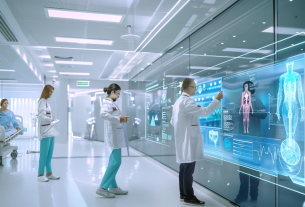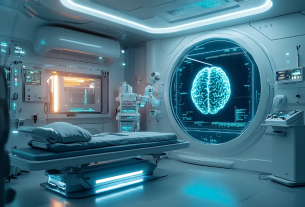A groundbreaking 3D telemedicine trial in Ghana is set to revolutionize healthcare in some of Africa’s most remote regions, where access to specialized medical care is limited. In late February, 46-year-old Charles Owusu Aseku, who has struggled for years with a keloid on his neck, participated in the first trial of the new technology. After unsuccessful surgeries and an unfruitful consultation in South Africa, Aseku was eager for a new solution.
The initiative, developed by Microsoft Research in collaboration with local doctors, leverages portable technology housed in a van to provide remote consultations. This system is especially crucial in regions with one of the lowest doctor-to-patient ratios globally. With enhanced lighting and camera upgrades, the technology captures a 3D model of the patient, which is then displayed on a large computer screen for multiple doctors to assess and offer their expertise.
Spencer Fowers, principal software developer and project lead at Microsoft, explained, “The van is designed to travel to remote villages without specialized care, enabling pre- and post-surgical consultations.” This approach also allows patients to receive multiple medical opinions in one session, with Aseku benefiting from consultations with doctors from Rwanda, Scotland, and Brazil.
The Koforidua Regional Hospital trial, which Aseku attended, is part of a larger effort to expand the use of telemedicine across Ghana and other African countries. The technology could significantly alleviate the burden on patients who often need to travel long distances for specialist care. George Opoku, a 68-year-old sarcoma patient, was able to avoid a costly trip to the capital Accra thanks to the trial, describing the experience as a hopeful step toward treatment.
However, the project faces challenges, including unreliable internet access in remote areas. Despite this, the technology is already helping patients in need of plastic surgery at the Korle-Bu Teaching Hospital in Accra, where an insufficient number of surgeons often forces patients to consult different doctors during each visit. Dr. Kwame Darko, a consultant plastic surgeon at Korle-Bu, sees great potential in 3D telemedicine for improving patient care in such scenarios.
Dr. Ahensan Dasebre, chief resident at the National Reconstructive Plastic Surgery and Burns Centre at Korle-Bu, noted that 3D telemedicine could address the shortage of doctors in remote areas, offering patients access to expert care from afar. If successful, the initiative could serve as a model for other regions facing similar healthcare challenges.
Source: Charles Owusu Aseku’s experience, Microsoft Research, Korle-Bu Teaching Hospital
AP Article: New 3D technology could soon bring surgeons closer to patients in Africa’s most remote regionsBy NAA ADORKOR CUDJOE



